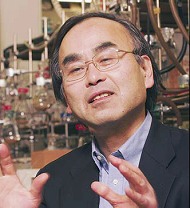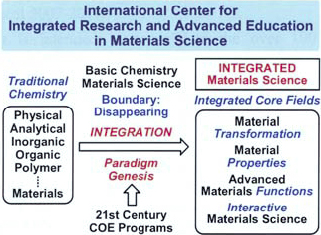Global COE Programs
"INTEGRATED MATERIALS SCIENCE":
A New Paradigm in Chemistry and Materials Science for a New Breed of Researchers

Program Leader:
Prof. Mitsuo SAWAMOTO
This article introduces the "International Center for Integrated Research and Advanced Education in Materials Science," a Global COE project for fiscal 2007-2011 granted in the area "Chemistry and Materials Science".
The project is intended to consolidate the more than 100 chemistry-related Kyoto University research groups in the Graduate School of Engineering, the Graduate School of Science, and the Institute for Chemical Research and thereby to blend virtually all aspects of chemistry, from basic to engineering and from molecules to materials, to create a new paradigm "integrated materials science."
Concept and Objectives
In contemporary science and particularly in chemistry, a trend is now obvious: an accelerated merging of disciplines (inorganic, organic, etc.), which in part stems from the recognition that traditionally trained experts, however excellent in a specific field they might be, can no longer cope with complex multifaceted problems such as sustainable growth and global warming.
The recognition, in turn, demands a new framework for research and education, which we coin as "integrated materials science" (Figure), to achieve the following:
- (a)"Integrated Materials Science"- A New Paradigm: An effective integration of basic chemistry and materials science in research and advanced education, beyond classical disciplines, faculties, and international borders.
- (b)A New Breed of Scientist: Cultivation of the next generation of internationally competent, creative, and independent scientists with expertise in multidisciplinary fields whose visions are open to society.
- (c)"Interactive Materials Science"- Science for Society: Creation of a renewed materials science, interactive and globally open, that contributes to solving critical problems such as sustainability as well as to culture.
Project Programs
To achieve (a) - (c) above, this project plans the following two programs:
(1) Program in Research: International Center for Integrated Materials Science
Integrated Core Fields: Integration beyond Disciplines. The first step is to create an "integrated materials science"; namely, to comprehensively integrate basic chemistry and materials science in Kyoto. Four integrated core fields will be organized (see Figure):
- Material Transformation
- Material Properties
- Advanced Material Functions
- Interactive Materials Science
Inter-Field Joint Research Projects: Integration beyond Core Fields. Joint projects among the integrated core fields will be organized to strengthen collaboration among members selected beyond faculty and traditional boundary.
Interactive Materials Science: Integration beyond Academia. Another feature of this project is to create a new materials science that is open to, interacts with, and contributes to the global society beyond academia.
International "Brain Influx" Epicenter: Integration beyond Borders. Programs will be implemented to establish an international epicenter of chemistry and materials science to attract the "best minds." These will include international exchange programs to send junior COE members to key overseas institutions and the Integrated Materials Science International Scholarship for bringing leading scientists to Kyoto for joint research, faculty training, and advanced education.
(2) Program in Education: A New Breed of Internationally Competent Young Scientists
Within the scope of "integrated materials science", the following programs will be organized to cultivate independent minds and international competence in junior COE faculty members and students:
Interfaculty Integrated Course Program. New integrated educational programs will be organized beyond faculties and specialties.
Interdisciplinary On-Site Research and Training. Advanced education and interdisciplinary training will be provided through the exchange of students and assistant professors within the core fields to perform on-site cutting-edge research within the COE Project.
Support Programs. International competence and independent research abilities will be cultivated in junior COE members and students through Embryonic Research Project Support, International Academic Exchange Program, and International Workshop Initiative (which provides financial support and advice to young scientists for planning international meetings sorely by themselves).
The Future
Chemistry is the only fundamental science that creates novel molecules and materials via infinite permutation of atoms and reactions. Through interdisciplinary collaboration with physics and biology, chemistry and materials science today are expected to make fundamental contributions to science and the global community.
Members of the COE Project are determined to develop the new paradigm of "integrated materials science" and to cultivate competent, creative, and energetic young scientists who will take off from Kyoto University to international arenas in science and beyond.

Figure. Integrated Materials Science:
A new paradigm in chemistry and materials science.

